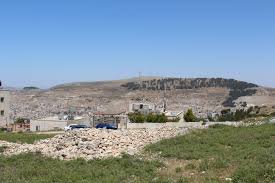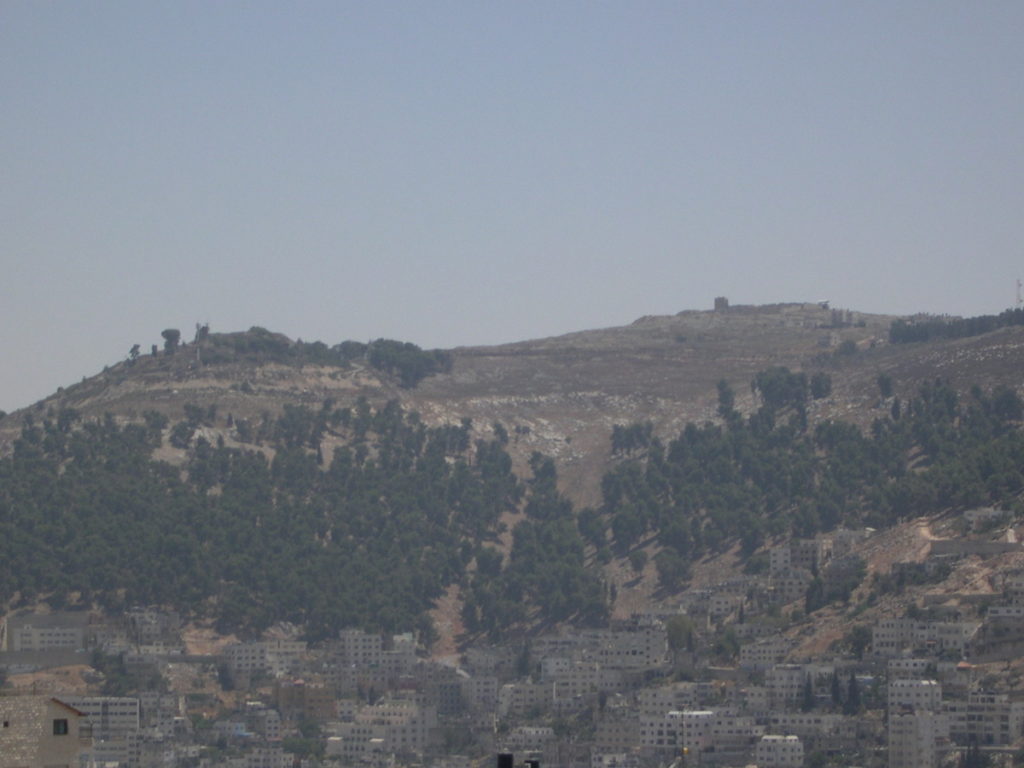
Deuteronomy 27:2–10, Set up for yourselves. Immediately upon crossing the Jordan and upon entering the Promised Land, YHVH instructed the Israelites to set up a stone monument containing the Torah and to construct an altar for burnt sacrifices. What is the significance of these and why was it so important that this be Israel’s first order of business upon entering the Land of Promise? Matthew Henry states in his commentary that the Word of YHVH (the Torah) and prayer (the altar) must always accompany each other. Discuss this and relate it to Psalms 51:16–19 and Hosea 6:6 and the believer’s spiritual walk. Also, why did YHVH command the Israelites to construct the altar of uncut and whole stones? To whom does this prophetically point? (Read Dan 2:35, 45; Ps 118:22; Matt 21:42; Luke 20:17.) The stones of the altar were rough and uncut. To whom does this point who became our Living (spiritual) Altar and Sacrifice? (See Isa 53:2.)

Deuteronomy 27:2, 4, 8, Set up great stones. On Mount Ebal on whole, un-cut stones, the Israelites were to write the Torah-law and then coat these stones with lime plaster. Elohim also told them to build an altar there where they were to make burnt and peace offerings. Why was the Torah written on stones on Mount Ebal—the mountain of the curses? Why not on Mount Gerizim, the mountain of blessing? Certainly this cannot mean that the Torah is a curse, for Paul calls it kadosh (holy), just and good in Romans 7:12. What could these stones represent symbolically? First, this symbology tells us that those who don’t follow the Torah will come under a curse, for to violate it is sin (1 John 3:4) and the wages of sin is death (Rom 6:23) and all have sinned (Rom 3:23). Second, Who is the Chief Cornerstone, the Stone the builders rejected (Ps 118:22; Matt 21:42; Acts 4:11; Eph 2:20), and the stone cut without hands (Dan 2:34)? What was the purpose of these offerings and to whom do the burnt and peace offerings point? Could white lime plaster symbolically represent the saints, the bride of Messiah, being clothed in robes of righteousness (see Rev 19:7–8)? Who is the King of Righteousness through whom redeemed sinners become righteous? Who is clothed in robes of righteousness once their sins have been atoned for? (Read Heb 7:2, 20–28 cp. Rev 19:7–8 cp. 3:5, 18; Isa 61:10.) Who was wounded for our transgressions and bruised for our iniquities, had laid on him the iniquities of us all, and was made an offering for sin (Isa 53:5, 6, 10)? Who was the Living Torah, the Word of Elohim made flesh (John 1:1, 14)? Who redeemed us from the curses of the law (Gal 3:13), which came upon us as a result of our sinning (sin is the violation of YHVH’s law, 1 John 3:4), and thus bringing a death penalty upon us (the wages of sin is death, Rom 6:23)? Is it now making sense why the Torah and the altar were placed on Mount Ebal? This is another one of the many prophetic shadow pictures in the Torah pointing to the redemptive work of Yeshua at the cross. Give glory to Elohim who knows the beginning from the end and to Yeshua the Messiah, the Lamb of Elohim, who was slain from the foundation of the world! Does this strengthen your faith that Yeshua is indeed the Messiah, the Lamb of Elohim slain from the foundation of the earth? Who else could have fulfilled these prophecies?
Deuteronomy 27:11–28:68, Moses commanded the people. YHVH required the Israelites to recite a “pledge of allegiance” affirming their commitment to him before entering the Land. What can we learn from this? Is this something we should do from time to time in our own spiritual walk: recite pledges of commitment to YHVH and set up spiritual markers or reference points in our lives as tokens of our allegiance to him to which we can harken back when the going gets tough? These are acts of the will that when done can engage the heart and stir up feelings of love, devotion and remembrance.

Deuteronomy 27:11–16, Freedom versus bondage. Christian author Matthew Henry in his commentary on this verse points out something very interesting that none of the Jewish Torah commentaries I have read mention: The six tribes appointed to read the blessings from Mount Gerizim were all children of free women (Leah and Rachel). What are the spiritual implications of this? (Compare this with Paul’s discussion of the free and bondwoman pertaining to Isaac and Ishmael in Galatians 4:21–31.) To which children do the promises of YHVH’s material and spiritual blessing (namely, eternal life through Yeshua the Messiah) belong: those who are in bondage to or under the curses of the Torah-law because they walk in sin (which is the transgression of the law, see 1 John 3:4), or to those who walk in obedience to the Torah (i.e. in sinlessness or who walk in YHVH’s instructions and teachings in righteousness)? This brings up yet another issue. Is the purpose of the Torah simply to condemn people, as is taught in the mainstream church, and to bring people into spiritual bondage, and beyond that, the Torah’s only purpose is to point people to the cross after which it is to be discarded like a dirty old rag? This may be what men’s traditions and doctrines teach, but this is not what the Word of Elohim declares. Selah.
Deuteronomy 27:11–28, Blessing and curses for obedience. In these verses we find listed some of the blessings and cures for Torah obedience. Do you believe the Torah principles (spiritual truths) of blessing for obedience and curses for disobedience to YHVH’s Word are for us today? If not why not? Is it because you are listening to Bible preachers and teachers who claim to know and teach the Word of Elohim, but who are instead teaching the doctrines and traditions of men by which the Word of Elohim has been made of none effect (see Mark 7:13)?
The following are some questions to ask yourself when considering Elohim’s Torah and the blessings and curses that come upon us as a result of our response to these instructions in righteousness, which are a reflection of the character and nature of the Creator: Does YHVH’s character, Truth or Word change? If the blessings listed in these verses are not being manifested in your life why might that be? Could it relate possibly to your level of Torah obedience and faith or trust level vis-à-vis YHVH and his Word? What changes could you make in your life that might place you in a more favorable position to receive his blessings rather than the curses?
Deuteronomy 27:15–18, The commandments are all inter-connected. To the casual reader, the admonitions contained in these verses may seem to be arranged in a random order, but this is not the case. Let’s discuss the purposeful design of the order in which Elohim gives this commandments.
Consider the following: The prohibition against idolatry (verse 15) is juxtaposed with that of degrading one’s parents (i.e. not honoring one’s parents, or as S. R. Hirsch states in his commentary, “who outwardly is respectful to his parents but inwardly considers himself vastly superior to them”) along with trespassing against one’s neighbor’s property by removing his neighbor’s boundary markers or landmarks.
Now consider this: One who does not honor and fear YHVH but turns to idolatry (the second commandments) will not honor one’s parents (the fifth commandment) (and vice versa) will likewise not honor the property of one’s neighbor (including his neighbor’s wife).
Juxtaposed next to these commands is the prohibition against misleading a blind person (verse 18). This means that we should not take advantage of one’s blindness by advising a blind person in a way beneficial to us and detrimental to him.
Following this commandment is the principle about one who steals justice from another by perverting judgment against one who is weaker socially or financially or who is less informed at law than another thereby giving the advantage to the stronger (The ArtScroll Davis Edition Baal HaTurim Chumash/Devarim, pp. 2126–2127).
Can you see how each command is interrelated with all the others? Does this not give one insight into the curious statement found in James 2:10, which declares that if you have broken one commandment you have broken them all? This should help us to see that in one way or the other, all of YHVH’s commandments are inter-related, all depend on each other, and they all stand or fall together.
Now relate James 2:10 back to verse eight of the same chapter where James notes that the entire Torah-law can be summarized as the “royal law of love.”
As you review YHVH’s list of prohibitions in Deuteronomy 27 can you see any other relationships between these juxtaposed concepts? Learning to exegete (draw truth out of) Scripture in this manner will yield a whole new level of spiritual revelation to the reader.


Which is why Yeshua told the adulterous woman “Go and SIN NO MORE.” not just don’t commit adultery anymore.